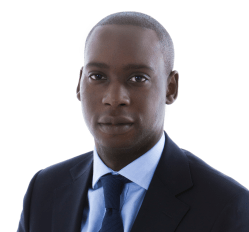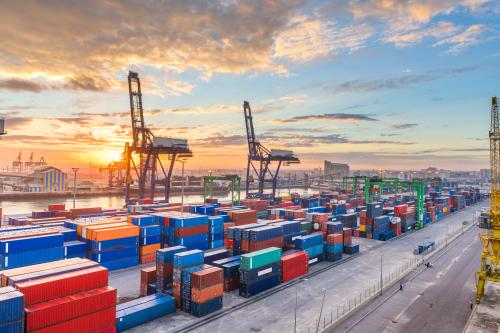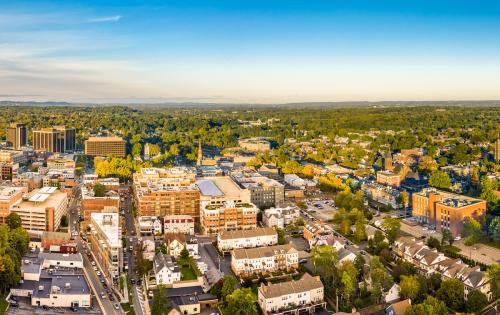The African Union’s Agenda 2063 and the African Free Continental Trade Agreement (AfCFTA) are two examples of landmark efforts to positively transform the continent. Host Landry Signé is joined by Chido Munyati, the head of Africa at the World Economic Forum, to discuss how the program is supporting these unprecedented initiatives. Munyati shares the current regional integration efforts, private sector partnerships, and how policymakers can leverage the demographic dividend to strengthen the continent.
- Subscribe and listen to Foresight Africa on Apple, Spotify, Afripods, or wherever you listen to podcasts.
- Watch episodes on YouTube.
- Learn about other Brookings podcasts from the Brookings Podcast Network.
- Sign up for the podcasts newsletter for occasional updates on featured episodes and new shows.
- Send feedback email to [email protected].
Transcript
[music]
SIGNÉ: Hello, I am Landry Signé, senior fellow in the Global Economy and Development Program and the Africa Growth Initiative at the Brookings Institution. Welcome to Foresight Africa podcast, where I engage with contributors to our annual Foresight Africa report, as well as with policymakers, industry leaders, and other key figures. You can learn more about this show and our work at Brookings dot edu slash Foresight Africa podcast.
Today on the podcast, I am pleased to welcome Chido Munyati. Chido is the head of Africa at the World Economic Forum, where he’s responsible for shaping and leading the regional Africa agenda. Prior to joining the Forum, Chido practiced law, including in the United Nations International Criminal Tribunal for Rwanda. Chido was selected as a World Economic Forum’s Global Leadership Fellow and an honoree of the top 100 under 40 Most Influential People of African Descent.
Welcome to the show, Chido.
MUNYATI: Thank you Landry. It’s a great pleasure to be on the show and I’m very much looking forward to the conversation.
SIGNÉ: How did you get the opportunity to join the World Economic Forum, Chido?
[1:56]
MUNYATI: So, in 2017, I was one of 19 emerging leaders selected as a Global Leadership Fellow at the World Economic Forum. This is a three-year journey that is designed to provide the fellows with the tools, the frameworks, and the experience required to drive systems-level change in public private partnerships. So, that’s how I joined the World Economic Forum. And then through successive roles, I then became the Head of Africa, and I’m responsible for shaping the regional agenda for Africa within the World Economic Forum.
SIGNÉ: Fantastic. The head of Africa is a huge role, especially given how diverse the continent is. Can you describe your responsibilities and the work you do, Chido?
[2:38]
MUNYATI: Absolutely, happy to do so, Landry. So, in general, my role is to shape the regional agenda for Africa. So, coordinating Africa work within the World Economic Forum. Specifically, this means, in partnership with our partners—so, leaders in the private sector, so CEOs of regional companies, leaders in the public sector, so ministers and heads of state, as well as academia and civil society, experts such as yourself, who are part of our Regional Action Group for Africa, who are really responsible for helping us shape an agenda for Africa, and then identifying priorities to work on to advance systems level change within Africa.
And importantly, we align our agenda with Agenda 2063 of the African Union, which is the region’s blueprint for industrialization and structural transformation. So, everything we’re doing is in pursuit and support of the region’s objectives.
In addition to that, I’m also responsible for managing relationships with our public sector leaders. And so, that’s effectively what I do in my role on a day-to-day basis.
SIGNÉ: Wonderful. And of course, I often see you are engaging with the global leader, with the head of state, head of government, and CEO of multinationals to really advance Africa’s priorities. And speaking about priorities, what are the Africa program’s current priorities, Chido?
[3:59]
MUNYATI: So, as I mentioned previously, we try to prioritize our objectives to ensure that they’re aligned or indexed to Agenda 2063. So, I’ll say there are about three or four big buckets that are aligned with particular objectives and outcomes of the Africa Union’s Agenda 2063.
So, the first I would say is related to advancing initiatives to support Africa’s youth. Seismic change is underway in Africa, as you know very well. By 2050, one in four people on Earth will be sub-Saharan African. And more than a third of the world’s young people are expected to be from our region.
So, to that end, we have various initiatives addressing skills and training. So, for example, we have a closing the skills gap accelerator in South Africa with the Department of Trade, as well as a similar initiative in Nigeria with the Ministry of Industry and Trade, which really aim to create national public-private collaboration platforms to address skills gaps as well as to reshape education and training for the future. So, really creating these frameworks to ensure that we’re addressing training and education for the future.
The second bucket I would say is around the energy deficit. I think it’s common knowledge that as many as 600 million Africans don’t have access to electricity. And we know there’s a direct correlation between energy consumption and GDP growth. And so, we have various initiatives where we’re trying to mobilize financing to support with energy infrastructure in Africa.
An example for this is our mobilizing investments in clean energy initiative. We have projects in Nigeria and South Africa. A month ago, in July, we held a roundtable in South Africa where we published a report that is looking at specific opportunities and gaps in finance and clean energy in Africa, where we had the presence of regional CEOs from South Africa, identifying those opportunities.
The second bucket is around digital inclusion. I think this is a topic that you know very well. I think the most respected publication relating to this topic is something that you wrote. And so, the World Economic Forum, we have pioneered this topic of the fourth industrial revolution. And so, what we have are these affiliate centers for the fourth industrial revolution. We have a Center for the Fourth Industrial Revolution in San Francisco, but we have a network of 16 affiliate centers. So, around the world. And these centers serve as trusted spaces for public-private cooperation, pursuing a human-centric approach to technology adoption, as well as governance.
And so, importantly, two of these centers are in Africa. One is in Rwanda. One is in South Africa. And happy to announce that we will be hosting, in collaboration with our Center for the Fourth Industrial Revolution in Rwanda, the first global AI summit in Africa, in October.
And then I’ll say finally, the final priority is really around accelerating regional integration. The Forum has an initiative, called the Forum Friends of the African Continental Free Trade Area. This is an effort to mobilize global business, the private sector to support with implementation of the African Continental Free Trade Area Agreement. This is really around encouraging them to think through these strategies around deepening the regional value chains in Africa and investing in critical infrastructure.
And so, in collaboration with these private sector companies, as well as yourself in Brookings, this year and at the annual meeting in Davos, we launched the first ever private sector action plan for the AfCFTA that includes key commitments from these private sector partners. And throughout this year and the years to come, we will be implementing those commitments.
So, I’ll say those are sort of the broad strokes of our priorities in the Africa agenda at the World Economic Forum.
SIGNÉ: What a comprehensive agenda, Chido! And you mentioned the World Economic Forum’s first private sector plan for the African Continental Free Trade Area recently launched, “An action plan to accelerate global business and investment in Africa.” I was really honored to collaborate with you on this action plan, Chido. And can you briefly outline the AfCFTA current state for those who are not familiar with it?
[7:42]
MUNYATI: No, thank you. Landry. Happy to. So, for those who are not familiar with the current status of the AfCFTA. The AfCFTA entered its operational phase in January 1st of 2021. As of now, 54 of the 55 African Union member states are signatories to this agreement, excluding Eritrea, which is a non-signatory party. Of these 54 countries, 47 countries have successfully ratified this agreement.
But more specifically, in addition to this agreement establishing the AfCFTA, there’s several protocols that give effect to the agreement. So, for example, we have the protocols on trade in goods and services and dispute settlements, which was renegotiated in the first phase. The second phase was included protocols on investments, competition policy, and intellectual property rights, which has been adopted by the AU Assembly. And then more recently, the third phase includes a protocol on digital trade, and protocols on women and youth in trade.
And this was presented to the AU Assembly this last February. The document is not yet published but is, I think, in circulation for people to take note of.
But finally, what I would like to share is that what’s exciting is that trade in goods and services is currently underway under the AfCFTA’s guided trade initiative. The objective of this pilot project really is to kickstart, or initiate trade between countries that are already interested in trading amongst each other, and that have met the minimum requirements for commencing trade. So, minimum requirements related to the trade schedule, concessions, as well as rules of origin under the agreement.
And the purpose of this really is to test the readiness of the private sector, to test the operational, institutional, legal, and trade policy environment of the agreements to ensure that it’s working as intended. So, eight African countries are currently trading. And hopefully this will give effect to the ambition of the free trade agreement.
SIGNÉ: I like how comprehensive and exhaustive you can be in such a short time, Chido. Under your leadership, the action plan entitled “An Action Plan to Accelerate Global Business and Investment in Africa” was launched at Davos 2024. What are some of the report’s key takeaways, especially given this incredible ambition?
[9:59]
MUNYATI: No, thank you, Landry. I think it was really an important report that really highlights on key and measurable commitments that the private sector has made. Some of the key takeaways, or I would define them as commitments, I guess can be bucketed into four separate groupings. I think these key commitments firstly include mobilizing financing, so, for upgrading infrastructure and transportation in the logistics sector. So, for example, DP World and Agility made some really strong commitments around this topic.
Secondly, I think development and deployment of green technologies in the automotive sector. So, we worked with the AAAM, the Automotive Association of Africa, as well as Volkswagen on these commitments, which are ongoing, and are going to be implemented.
Thirdly, and probably the largest space for opportunity, the creation and expansion of regional value chains for agriculture within the continent. Here we had some really fantastic commitments from the likes of Coca-Cola, AB InBev, Heineken, OCP, etcetera.
And then finally we got some commitments from the pharmaceutical industry. This was really around ensuring the increased access to pharmaceuticals and medical device products on the African continent. And in fact, we just recently launched a workstream under the guidance of the AfCFTA Secretariat looking at falsified medicines, because this is one of the bottlenecks in terms of enabling the scaling of pharmaceuticals on the African continent.
So, those are very high level, summaries of some of the key takeaways. And I hope your listeners will have an opportunity to go to the website and download the report in full.
SIGNÉ: Thank you for sharing where they can find the report. And have you seen, Chido, policymakers or businesses utilizing any of the guidance included in the report?
[11:42]
MUNYATI: Absolutely. I think one key example is with Coca Cola. So, the guidance around deepening agricultural value chains in Africa is something that they’ve taken to heart. So, in partnership with the World Economic Forum and the Global Alliance for Trade Facilitation, Coca-Cola has launched what they’re calling the Mango Hub. Effectively, what this is is establishing a regional value chain in the East Africa community for mango puree. So, instead of Coca Cola having to import these mangoes from abroad, they’re creating a market for those mangoes within East Africa so they can be traded across borders, creating a market for these mangoes. And hopefully this will be a proof of concept as well as inspiration to expand this beyond mangoes, but to other agricultural products.
So, I’ll say this is one key example of something concrete that’s being driven under the report. And there’ll be many other similar examples that will be implemented in the years to come.
SIGNÉ: Insightful, Chido. Much of your recent written work at the Forum has focused on the AfCFTA and climate change. Do you see any opportunities for the AfCFTA to address some of the issues brought on by climate change, such as financing challenges?
[12:58]
MUNYATI: No, absolutely. I think the AfCFTA presents several opportunities to address climate change issues while still promoting growth and trade within Africa. I’ll say there’s probably sort of four or five big issues that can be addressed, climate change issues that can be addressed by the agreement.
So, firstly, I think the AfCFTA can encourage green industrialization by incentivizing the adoption of cleaner technologies and renewable energy sources as African countries increase their manufacturing and production. So, this is really coming up with an AfCFTA industrial policy for green industries in Africa, similar to what we see with IRA in the United States or similar policies in Europe. So, I think that’s one big opportunity.
The second big opportunity really is to facilitate the creation of stronger energy markets in Africa, leveraging Africa’s abundance in renewable resources like geothermal, wind, hydro. For example, what they’re doing in Namibia around green hydrogen. Really making Namibia a hub for green hydrogen to then present opportunities to scale energy production within the African continent.
The third and perhaps the most obvious, one is to increase intra-Africa trade of agricultural products. On the one hand, this will improve food security in Africa, but importantly, it would reduce reliance on having to import this large source of imports related to foods associated with emissions from abroad. So, really ensuring that we’re deepening those value chains in Africa and not relying on imports.
And then finally, as you mentioned, around financing. You and I wrote a blog about this a few months back related to COP. The AfCFTA provides a framework to attract investments as well as innovative financing mechanisms such as green bonds to support trade and climate objectives.
So, I think these are four or five big opportunities where we see the AfCFTA, the framework of the agreement, enabling and addressing important climate-related issues.
SIGNÉ: We can clearly see here the benefits of the African Continental Free Trade Area in advancing a green transition.
As you know, Chido, from previous Foresight Africa podcast episodes, I love finishing this session with a couple of questions for all my guests. AGI looks at Africa from an economic perspective, and we focus on how to accelerate economic growth and structural change while fostering inclusion, especially for youth and women on the continent. Building on your work and experience, what is one piece of advice you would give to African or global policymakers to ensure the best outcomes on the continent?
[15:42]
MUNYATI: Thanks, Landry, I think this is a very important question. If I had to pick one piece of advice for policymakers in Africa or globally, to support, positive outcomes for African continent, I think the one piece of advice is to invest in Africa’s youth. As I mentioned at the top of the podcast, sub-Saharan Africa is expected to account for 90% of the growth in the world’s working age population.
So, we are going to be the dynamism, we’re going to be the engines of growth. There’s a real potential for Africa’s youth to really propel and drive global growth if we invest, in the youth in terms of skills, training, and ensuring that they have the digital skills to contribute to these emerging types of jobs that will be presented.
And this is in the context, obviously, where we have declining populations in China, in Germany, and in Japan. So, I think Africa has a real opportunity to leverage this demographic dividend.
Unfortunately, right now, we’re not creating enough jobs. I think it was a Brookings report that identified that although 8 to 11 million Africans enter the labor market yearly, only 3 million jobs are created related to that.
And so, I think encouraging investment in human capital, including education, including skills, and demand growth enhancing sectors will be critical for the years ahead. And I think if policymakers can come up with good investment policies related to the youth, Africa has a good shot at realizing its potential and being a driver of global growth.
SIGNÉ: Fantastic, Chido. Given you a successful career and impact, what advice would you give to youth and women hoping to follow in your footsteps?
[17:20]
MUNYATI: That’s a great question, Landry. I think the piece of advice that I would give and what’s worked for me is I think once you identify your passion, ensuring that you nurture that desire by really having a long-term goal or objective. So, ensuring that you have a north star and then thinking backwards in terms of milestones. I think having a long-term perspective is particularly important, particularly at where we are in terms of some of the technology disruption that we see. It’s easy to be thrown off by all these constant changes and evolutions that we’re seeing. And so, being grounded with a long-term vision, I think is very important.
And ensuring that you’re continuously learning, I think, will also be very key. With generative AI, we see that changes are taking place overnight within a matter of days. And so, continuing to learn and having a curiosity will be very vital to ensuring that you are marketable and able to continue to achieve the things that you hope to contribute to the world.
And then I’ll say, finally, an important thing to keep in mind is to have strong mentorship. So, to having some guardrails, someone who can help listen to your ideas as a sounding board as well as to sort of help you think through how you’re making decisions, and helping you come to an optimal outcome.
So, those are some of the ideas that I would share that have worked for me. But I think there are many ways to get there. But I think investing in the process, as I said, having a long-term vision is key, and I would encourage young people to do that.
SIGNÉ: Thank you so much for joining us today, Chido.
MUNYATI: Thank you. Landry. It’s been a pleasure. And I look forward to seeing you soon and continuing the work that we’re doing related to integration in Africa.
SIGNÉ: Looking forward to it. Bye-bye.
MUNYATI: Thank you. Bye-bye.
[music]
SIGNÉ: I am Landry Signé, and this has been Foresight Africa. To learn more about this show and our report, visit Brookings dot edu slash Foresight Africa podcast.
The Foresight Africa podcast is brought to you by the Brookings Podcast Network.
My special thanks to the production team, including Kuwilileni Hauwanga, supervising producer; Fred Dews, producer; Nicole Ntungire and Alexandria Cordero, associate producers; and Steve Cameron, audio engineer.
This show’s art was designed by Shavanthi Mendis. Additional support for this podcast comes from my colleagues in Brookings Global and the Office of Communications at Brookings.
Send your feedback and questions to podcasts at Brookings dot edu.





Commentary
PodcastWhat’s on the World Economic Forum’s agenda for Africa?
August 21, 2024